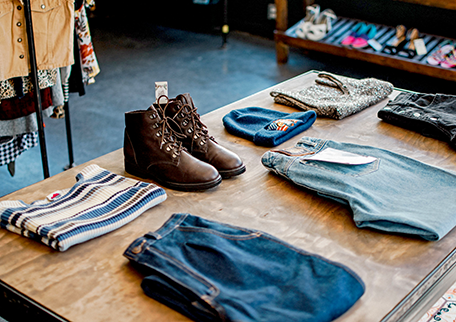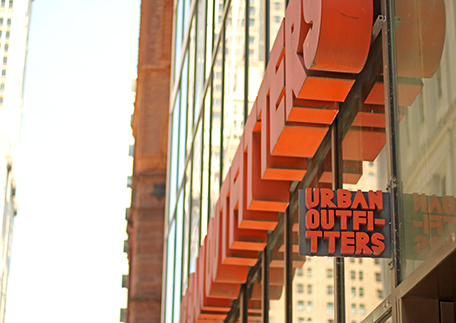Companies That Repurpose
This blog post was written by Liluye Staff Writer, Katie Hutchinson, who is a driven and compassionate environmentalist and humanitarian.
Used, second-hand, preloved, however you want to label it, everyone loves it.
Choosing to not buy new clothing is one of the best options a consumer can make, but choosing vintage and rummaging through thrift stores don’t have to be the only options. Companies have acknowledged that the hunt for that perfect and very limited item isn’t always desired or should be the only opportunity for shoppers who want to do their part. Instead, upcycling is a way designers can take discarded items and repurpose them into new designs.
Upcycling isn’t a new trend but it’s quickly gaining in popularity. Brands are selecting innovative techniques with eco-friendly designs to not only promote the brands’ values but demonstrate a deeper meaning of what the fashion industry is capable of. Fashion that is sustainable, affordable, and current can coexist.
When you upcycle, you are reducing waste as well as reusing materials potentially making the goods higher quality than it was previously; in an innovative way. This allows designers, labels, and artists to put their spin on an existing foundation.
According to the World Bank’s 2019 climate impact report, fast fashion impacts climate change and is responsible for 10% of global emissions of fossil fuels. The industry relies heavily on cheap manufacturing and the understanding that garments are to be discarded quickly when a trend finishes. This dangerous trend has not been scaled back even with more awareness on the detrimental impact it produces. But shoppers, like myself, are happy to see upcycling and repurposing picking up steam as a new reality for many.
It’s hard to know where to start when looking for brands that are improving their environmental impact, so to help, here is a list of companies for all budgets, that repurpose garments and are doing their part to create a more sustainable future. Instead of me trying to sell you on what they represent and value, I’ll let each company do it for themselves; in their words. Check them out:
Brands based in USA / Canada
1. Reformation: Claims that, “being naked is the #1 most sustainable option,” and that they’re “#2.”
2. Outerknown: States that they’re, “committed to protecting the environment and supporting fair labor.”
3. KINdom: KINdom “uses sustainable, natural, recycled, reclaimed, and indigenous materials, fair trade-made in ethical and compliant facilities, while also offering size-inclusive and gender-inclusive fashion.”
4. Arielle: Declares that they make, “simple clothes for colorful people. Free of trash and exploitation. Stylish, sexy, sustainable,” and that they “make the world we want to see.”
5. Patagonia: Aims to be, “one of the most altruistic companies that promote sustainability, fashion, comfort, and environmentalism.”
6. Urban Outfitters: Says that they are, “a lifestyle retailer dedicated to inspiring customers through a unique combination of product, creativity, and cultural understanding.”
7. Zero Waste Daniel: Known as, “a New York-based clothing designer and zero-waste lifestyle pioneer who uses pre-consumer waste sourced from New York City’s garment industry, as well as other hard-to-recycle materials, to create his line of genderless clothing and accessories that send nothing to landfills.”
8. Naadam: Recognized for being a cashmere company focused on “sustainable and ethical business practices that have been a part of [it] since day 1.”
Brands based in UK / Europe
1. Organic Basics: Claims that they, “only choose fabrics that care for our environment and [they] only ever partner with factories that care about their impact, too. When [they] say sustainability is [their] core mission [they] don’t mean that sustainability is nice to have – [they] mean that it’s the only way [they] act.”
2. FanFareLabel: States that they are, “a sustainable fashion house, tackling fashion’s waste crisis.” According to them, “the exorbitant amount of waste generated in the fashion industry inspired Fanfare Label to represent the circular economy standard; the label is a representative of what fashion could and should look like.”
3. Picture Organic: Say that, “since day one, [they] have always sought to push one step further to minimize [their] impact on the environment. Fighting climate change through [their] passion for board sports and great outdoors, this is [their] mission. [They] claim [their] brand values loud and clear: Ride, Protect and Share.”
4. Ruby Moon: Focuses on, “cleaning up the oceans and empowering women entrepreneurs around the world, since 2010.” They claim to be “the world’s only completely circular, not-for-profit swim and activewear brand.”
5. Beyond Retro: Started as, “a single warehouse-turned-retail store in East London, stocked with an eclectic range of vintage sourced from around the globe.” They claim that, “thirteen years, eight more stores and an e-commerce site later” that they “have carved a unique identity as the leading vintage retailer across the UK and Sweden, and remain a seminal reference point for individuals of style – as well as a key stakeholder in the circular economy.”



